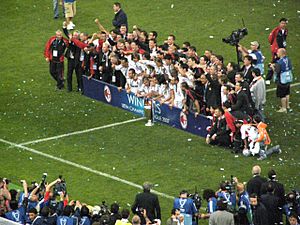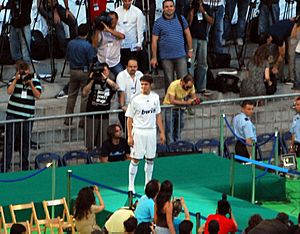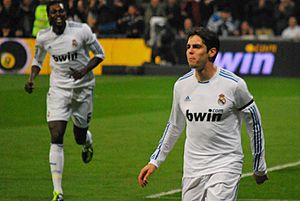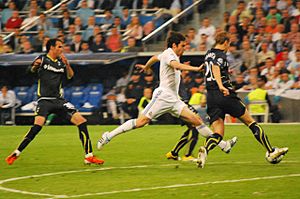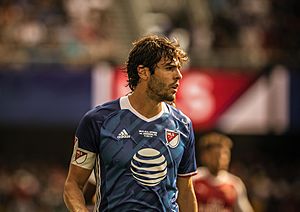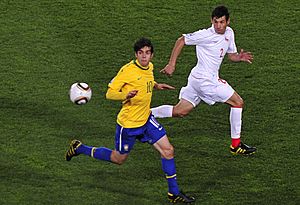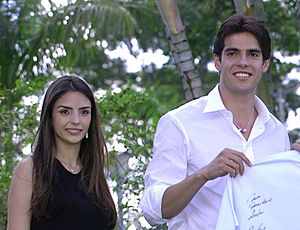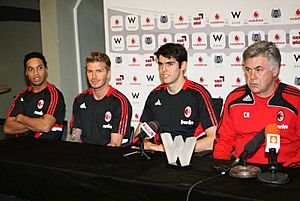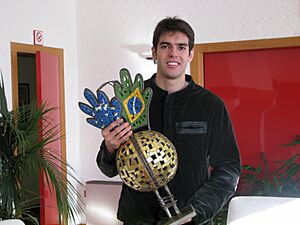Kaká facts for kids
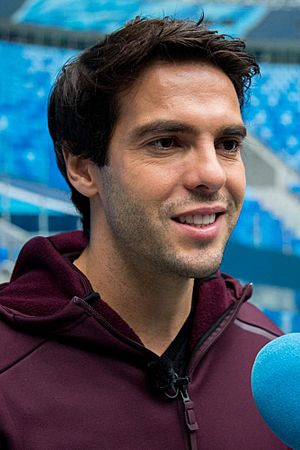
Kaká in 2018
|
|||||||||||||||||||||||||||||||
| Personal information | |||||||||||||||||||||||||||||||
|---|---|---|---|---|---|---|---|---|---|---|---|---|---|---|---|---|---|---|---|---|---|---|---|---|---|---|---|---|---|---|---|
| Full name | Ricardo Izecson dos Santos Leite | ||||||||||||||||||||||||||||||
| Date of birth | 22 April 1982 | ||||||||||||||||||||||||||||||
| Place of birth | Gama, Federal District, Brazil | ||||||||||||||||||||||||||||||
| Height | 1.86 m (6 ft 1 in) | ||||||||||||||||||||||||||||||
| Position(s) | Attacking midfielder | ||||||||||||||||||||||||||||||
| Youth career | |||||||||||||||||||||||||||||||
| 1994–2000 | São Paulo | ||||||||||||||||||||||||||||||
| Senior career* | |||||||||||||||||||||||||||||||
| Years | Team | Apps | (Gls) | ||||||||||||||||||||||||||||
| 2000–2003 | São Paulo | 59 | (23) | ||||||||||||||||||||||||||||
| 2003–2009 | AC Milan | 193 | (70) | ||||||||||||||||||||||||||||
| 2009–2013 | Real Madrid | 85 | (23) | ||||||||||||||||||||||||||||
| 2013–2014 | AC Milan | 30 | (7) | ||||||||||||||||||||||||||||
| 2014–2017 | Orlando City | 75 | (24) | ||||||||||||||||||||||||||||
| 2014 | → São Paulo (loan) | 19 | (2) | ||||||||||||||||||||||||||||
| Total | 461 | (149) | |||||||||||||||||||||||||||||
| International career | |||||||||||||||||||||||||||||||
| 2001 | Brazil U20 | 5 | (1) | ||||||||||||||||||||||||||||
| 2002–2016 | Brazil | 92 | (29) | ||||||||||||||||||||||||||||
|
Medal record
|
|||||||||||||||||||||||||||||||
| *Club domestic league appearances and goals | |||||||||||||||||||||||||||||||
Ricardo Izecson dos Santos Leite (born 22 April 1982), known to many as Kaká, is a famous Brazilian former professional footballer. He played as an attacking midfielder, a player who helps both defend and score goals. Kaká was known for his amazing speed, dribbling skills, passing, and scoring goals. Many people consider him one of the greatest football players of all time.
Kaká achieved great success with both his clubs and the Brazilian national team. He is one of only nine players to have won the FIFA World Cup, the UEFA Champions League, and the Ballon d'Or. The Ballon d'Or is a prestigious award given to the best male football player in the world.
Kaká started his professional career at age 18 with the Brazilian club São Paulo FC in 2001. He then moved to the Italian club A.C. Milan in 2003. He helped Milan win the Serie A title in his first season. He also led Milan to win the 2006–07 UEFA Champions League, where he was the top goalscorer. For his amazing performances, he won the FIFA World Player of the Year award, the 2007 Ballon d'Or, and the UEFA Club Footballer of the Year award in 2007.
After six years with Milan, Kaká joined Real Madrid CF in 2009. His transfer fee was €67 million, which was one of the highest at that time. However, his time in Madrid was affected by injuries. He returned to AC Milan for one season in 2013 before joining the new MLS team Orlando City SC. He played for Orlando City until he retired from professional football in 2017.
Kaká first played for the Brazil national football team in 2002. He was part of the squad that won the 2002 FIFA World Cup that same year. He also played in the 2006 and 2010 World Cups. He helped Brazil win the FIFA Confederations Cup in 2005 and 2009. In 2009, he won the Golden Ball award as the best player in the Confederations Cup.
Between 2006 and 2009, Kaká was chosen for the FIFA World XI and the UEFA Team of the Year three times. In 2010, he was added to the AC Milan Hall of Fame. Kaká was also known for his work outside of football. He became the youngest ambassador for the UN World Food Programme in 2004. Time magazine named him one of the world's 100 most influential people in 2008 and 2009.
Contents
Early Life and Football Beginnings
Ricardo Izecson dos Santos Leite was born on 22 April 1982, in Gama, Brazil. His family was financially stable, which allowed him to focus on both school and football. His younger brother, Digão, and cousin, Eduardo Delani, also became professional footballers. Digão used to call him "Caca" when they were little because he couldn't say "Ricardo" properly. This nickname eventually became "Kaká."
When Kaká was seven, his family moved to São Paulo. His school helped him join a local youth club called "Alphaville." There, he was noticed by the famous club São Paulo FC, who invited him to join their youth academy. At 18, Kaká had a serious swimming pool accident that could have ended his career. He suffered a spinal fracture but made a full recovery. He believes his recovery was a miracle from God.
Club Career Highlights
Starting at São Paulo
Kaká started playing for São Paulo's youth team when he was eight. He signed his first professional contract at 15. He helped the São Paulo youth team win the Copa de Juvenil tournament. He made his first team debut on 1 February 2001. In that season, he scored 12 goals in 27 games. He also helped São Paulo win their first and only Torneio Rio-São Paulo championship. In the final, he scored two goals in just two minutes!
In the next season, he scored ten goals in 22 matches. By this time, big clubs in Europe started to notice his talent. Kaká played a total of 58 games for São Paulo, scoring 23 goals.
Joining AC Milan
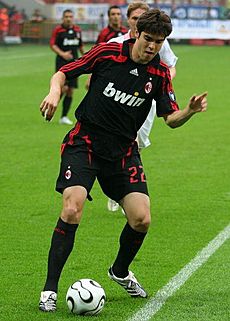
In 2003, Kaká joined the Italian club A.C. Milan, who were European champions at the time. The transfer fee was €8.5 million. He quickly became a key player, replacing Rui Costa in the attacking midfield position. He made his Serie A debut in a 2–0 win against Ancona. In his first season, he scored ten goals in 30 games and provided many important assists. Milan won the Scudetto (Italian league title) and the UEFA Super Cup. Because of his great first season, Kaká was named Serie A Footballer of the Year in 2004.
In the 2004–05 season, Kaká was a vital part of Milan's midfield. He played behind the main striker, Andriy Shevchenko. He scored seven goals in 36 league games as Milan finished second in the league. He also played a huge role in Milan reaching the Champions League final against Liverpool. Milan was leading 3–0 at halftime, but Liverpool made an incredible comeback to win 3–2 on penalties. This match is famously known as the "Miracle of Istanbul." Even though Milan lost, Kaká was named the 2005 UEFA Club Football Best Midfielder.
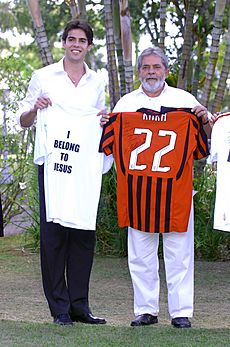
In the 2005–06 season, Kaká scored his first hat-tricks (three goals in one game) in Italy. He scored 17 goals in the league that season. Milan reached the semi-finals of the Champions League but lost to Barcelona. Kaká was chosen for the UEFA Team of the Year and the FIFPro World XI for the first time.
When Andriy Shevchenko left for Chelsea in the 2006–07 season, Kaká became the main attacking player for Milan. He scored his first Champions League hat-trick against Anderlecht. He finished as the top scorer in the 2006–07 Champions League with ten goals. He scored three goals against Manchester United in the semi-finals.
Kaká won the Champions League title when Milan beat Liverpool 2–1 on 23 May 2007. This win was special because it was revenge for the loss two years earlier. Even though he didn't score, he helped set up both of Filippo Inzaghi's goals. After this success, Kaká received many individual awards. He was named the UEFA Club Footballer of the Year and was part of the UEFA Team of the Year again. He also won the IFFHS World's Best Playmaker award in 2007.
Milan started the 2007–08 season by winning the 2007 UEFA Super Cup against Sevilla. Kaká scored a goal in that match. On 2 December 2007, Kaká won the Ballon d'Or, becoming the eighth Milan player to receive this award. He finished far ahead of Cristiano Ronaldo and Lionel Messi. He signed a new contract with Milan until 2013.
On 16 December, Kaká helped Milan win the FIFA Club World Cup against Boca Juniors. He scored Milan's third goal in a 4–2 victory. He also assisted two other goals. He was given the Golden Ball as the best player of the tournament. The next day, Kaká was voted the 2007 FIFA World Player of the Year.

In January 2008, Kaká was named the Serie A Footballer of the Year for the second time. Time magazine included Kaká in their Time 100 list of the world's most influential people in both 2008 and 2009. He finished the 2007–08 season with 15 goals in Serie A. His amazing goals included a long-range shot against Lazio and a dribbling run past several players against Udinese. He was nominated for the 2008 FIFA World Player of the Year and the 2008 Ballon d'Or. He was also chosen for the FIFPro World XI for the third time.
In January 2009, there were reports that Manchester City offered over £100 million for Kaká. Milan's owner, Silvio Berlusconi, announced that Manchester City had ended their offer and that Kaká would stay with Milan. Milan fans protested to keep him, and Kaká showed his jersey from his window to thank them. Kaká scored 16 goals in his final season with Milan, helping them finish third in Serie A. He was again nominated for the 2009 FIFA World Player of the Year and the 2009 Ballon d'Or. He was also named in the UEFA Team of the Year for the third time.
Moving to Real Madrid
On 8 June 2009, Milan and Real Madrid confirmed that Kaká would move to the Santiago Bernabéu Stadium for €67 million. He was presented as a Real Madrid player on 30 June 2009. He made his first unofficial appearance on 7 August 2009 in a friendly match. He scored his first goal for Madrid in a pre-season game on 19 August 2009. Kaká made his league debut on 29 August 2009. He scored his first league goal, a penalty, on 23 September. Real Madrid finished the season as runners-up in La Liga. Kaká scored eight goals and provided six assists in the league.
In August 2010, Kaká had surgery on a long-term left knee injury. He was out of action for about four months. After an eight-month absence, Kaká returned to play on 3 January 2011. He said he was "happy for playing a game again." His first league goal after his injury came on 9 January 2011.
In March 2011, Kaká had another injury that kept him out for a few weeks. When he returned, he scored two goals in a big win against Valencia. At the end of his second season, Real Madrid won the Copa del Rey. They finished second in La Liga and were knocked out of the Champions League by Barcelona. Kaká finished the season with seven goals and six assists in 20 games.
On 27 September 2011, Kaká had one of his best games for Real Madrid in a 3–0 win against Ajax in the Champions League. He scored a goal, provided an assist, and was part of an amazing team play. He was chosen as the best player of that Champions League matchday. In the 2011–12 season, Real Madrid won La Liga with a record 100 points. Kaká provided nine assists and scored five goals in the league. However, they were eliminated from the Champions League semi-finals by Bayern Munich after a penalty shootout.
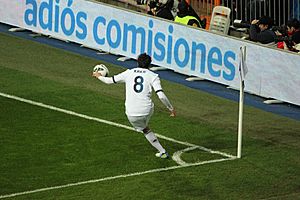
Real Madrid started the 2012–13 season by winning the 2012 Supercopa de España against Barcelona. On 4 December 2012, Kaká scored in a 4–1 win against Ajax. This goal made him the top Brazilian goalscorer in Champions League history with 28 goals. He said it was an "important goal" for him. On 12 January 2013, Kaká received his first red card for Real Madrid. Real Madrid finished second in La Liga and were runners-up in the Copa del Rey. They were also knocked out of the Champions League semi-finals.
On 29 August 2013, Kaká decided to leave Real Madrid. He had scored 29 goals and provided 32 assists in 120 games over four seasons. He said goodbye to the club and fans on Twitter.
Returning to AC Milan
On 2 September 2013, Milan confirmed that Kaká would return to the club on a free transfer. He signed a two-year contract and was given his old number 22 shirt. He was also made the team's vice-captain. In his first game back, he tore a muscle and decided not to take any wages until he was fit again.
He returned to play on 19 October. In his next match, he assisted a goal in a 1–1 draw against Barcelona in the Champions League. His first goal back for Milan was a fantastic curling shot against Lazio on 30 October. On 7 January 2014, Kaká scored his 100th goal for Milan. He scored twice in his 300th match for Milan on 29 March 2014.
In June 2014, it was reported that Kaká was talking to Orlando City SC about joining them in January 2015. On 30 June 2014, Kaká's contract with Milan ended by mutual agreement because the team did not qualify for European competitions.
Playing for Orlando City
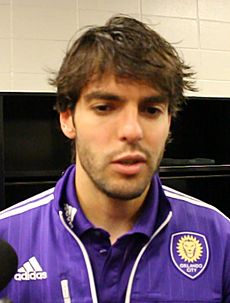
Kaká joined the new MLS team Orlando City as their first "Designated Player." He had always wanted to play in the United States. Until Orlando joined the league in 2015, Kaká was loaned back to his first club, São Paulo. By signing with Orlando City, Kaká became the highest-paid player in MLS history.
Loan to São Paulo
On 3 July 2014, Kaká arrived at São Paulo. He made his comeback in a league match on 27 July 2014, scoring a goal, though his team lost. He also scored in the 2014 Copa Sudamericana and in a league victory in November 2014.
Return to Orlando City
Kaká scored in his first friendly match for Orlando City. On 8 March 2015, he scored a free kick to equalize in a 1–1 draw on his MLS debut against New York City FC. This was Orlando City's first goal in their competitive history. He scored and assisted in a draw against Montreal Impact. He was named to the 2015 MLS All-Star Game as the team's captain. In the All-Star Game, he scored a penalty and assisted a goal, helping the MLS All-Stars win 2–1. Kaká was named the MVP of the match. He finished his first MLS season with 9 goals and 7 assists in 28 games.
Kaká missed the first three matches of the 2016 MLS season due to injury. He returned on 3 April, assisting two goals and scoring one himself in a 4–1 win. He was named Player of the Week. In July 2016, he was again chosen for the 2016 MLS All-Star Game. He finished his second MLS season with 9 goals and 10 assists in 24 games.
On 5 March 2017, in Orlando City's first match of the MLS season, Kaká got injured early in the game. He was out for 6 weeks with a hamstring strain. He returned and scored in a 2–0 win on 29 April. He scored two more goals in May. On 7 July, he was chosen for the 2017 MLS All-Star Game for the third year in a row. On 6 October, his goal against the New England Revolution was named Goal of the Week.
Orlando City was eliminated from playoff contention on 7 October. Kaká announced on 11 October 2017 that he would not renew his contract with Orlando City. He played his last official match for Orlando on 15 October. He finished the 2017 MLS season with 6 goals and 5 assists in 23 league games. In total, Kaká played 75 league games for Orlando, scoring 24 goals and providing 22 assists.
Retirement from Football
Kaká announced his retirement from football on 17 December 2017. He had turned down offers from his former clubs, São Paulo and AC Milan. He also said he was interested in working as a director in football, and Milan had offered him a role.
International Career for Brazil
Youth and Early Senior Career
Kaká played for Brazil in the 2001 FIFA World Youth Championship. He made his debut for the senior Brazil team in a friendly match against Bolivia on 31 January 2002. He was part of Brazil's 2002 FIFA World Cup-winning squad in Korea/Japan. He played only 25 minutes in one match during that tournament.
In 2003, Kaká was the captain for the 2003 CONCACAF Gold Cup. Brazil, playing with their under-23 team, finished second to Mexico. He scored three goals in the tournament.
First Confederations Cup and 2006 World Cup
Kaká was part of Brazil's squad for the 2005 FIFA Confederations Cup in Germany. He played in all five matches and scored one goal in a 4–1 win over Argentina in the final.
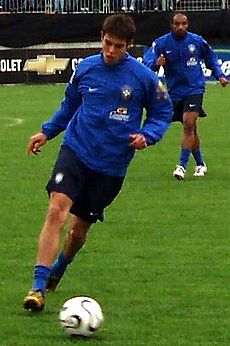
Kaká started in his first FIFA World Cup in 2006. He scored his first and only goal of the tournament with a powerful shot from 25 yards in Brazil's 1–0 win over Croatia. He was named Man of the Match for that game. However, Brazil was eliminated by France in the quarter-finals.
In a friendly match against Argentina in London on 3 September 2006, Kaká scored an amazing goal. He ran with the ball from his own half, outrunning Lionel Messi, and scored. He considers this his greatest goal ever. In 2007, Kaká decided not to play in the 2007 Copa América because of his busy schedule. Brazil won the tournament without him. On 11 October 2008, Kaká scored the first goal in Brazil's 4–0 win against Venezuela in a World Cup qualification game.
Second Confederations Cup and 2010 World Cup
Kaká played in the 2009 FIFA Confederations Cup, wearing the number 10 shirt. He scored two goals in Brazil's first group stage game against Egypt. He also provided two assists during the tournament. He received the Golden Ball as the best player of the Confederations Cup. He was also named Man of the Match in the final, where Brazil beat the United States 3–2.
At the 2010 World Cup in South Africa, Kaká received a red card in the match against Ivory Coast. He ended the tournament with three assists, making him one of the top assist providers. However, he did not score any goals. Brazil lost 2–1 to the Netherlands in the quarter-finals.
Later International Career
After more than a year away due to injuries, Kaká was called back to the national team in October 2011 for friendly matches. However, he had to withdraw again due to a calf injury.
He returned to the Brazil squad in September 2012 for friendly matches against Iraq and Japan. Kaká said he was "extremely happy" to be called up again. Brazil's coach, Mano Menezes, believed Kaká could play well with other attacking midfielders. On his return, Kaká scored in both matches, a 6–0 win over Iraq and a 4–0 win over Japan.
In March 2013, Kaká was called up by the new Brazil coach, Luiz Felipe Scolari, for friendly games. However, he was not chosen for the 2013 Confederations Cup or the 2014 World Cup squad. After almost 18 months, Kaká was recalled to the Brazilian team in October 2014 for friendly matches. In August 2015, he was named as a stand-by player for the 2015 Copa América. He made his 90th appearance for Brazil in September 2015. In May 2016, he was called up for the Copa América Centenario as a replacement for an injured player. But another muscle injury forced him to withdraw from that tournament as well.
Personal Life
Kaká married his childhood sweetheart, Caroline Celico, on 23 December 2005. They had two children, a son and a daughter. In 2015, Kaká and Celico announced their divorce.
Kaká became an Italian citizen on 12 February 2007. He appeared in many Adidas advertisements. He also had a modeling contract with Armani.
Kaká was featured on the cover of the Italian version of the EA Sports video game FIFA 07, alongside Ronaldinho. He also appeared on the covers of other FIFA games, including FIFA 11, FIFA 12, and FIFA 16. He was also an "Ultimate Team Icon" in FIFA 20.
Kaká looked up to Raí, a former Brazilian national team captain, as his football role model. He is close friends with former professional footballer Marcelo Saragosa and Colombian striker Radamel Falcao.
In April 2012, Kaká became the first sportsperson to reach ten million followers on Twitter. By March 2015, he had the fifth-highest social media following among athletes, with 33 million Facebook fans.
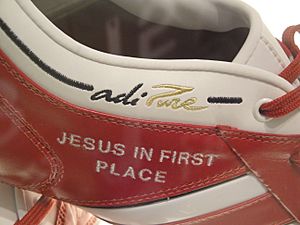
Kaká is an evangelical Christian and an active member of his church in São Paulo. He became very religious at age 12. He often showed his faith after winning matches, by revealing an "I Belong to Jesus" T-shirt. He also had "I Belong to Jesus" and "God Is Faithful" stitched onto his football boots. After Brazil won the 2005 Confederations Cup final, he and his teammates wore T-shirts that said "Jesus Loves You." When he received the FIFA World Footballer of the Year award in 2007, he said that God gave him more than he ever asked for. His goal celebration is always pointing to the sky to thank God. Kaká's favorite music is gospel, and his favorite book is the Bible.
Since November 2004, Kaká has been an Ambassador Against Hunger for the United Nations' World Food Programme. He was the youngest person to hold this role in 2004. In August 2015, Kaká announced he would study Sports Marketing at Full Sail University in Florida. On 5 January 2019, he announced his engagement to Brazilian model Carolina Dias.
Career Statistics
Club
| Club | Season | League | National cup | Continental | Other | Total | ||||||
|---|---|---|---|---|---|---|---|---|---|---|---|---|
| Division | Apps | Goals | Apps | Goals | Apps | Goals | Apps | Goals | Apps | Goals | ||
| São Paulo | 2001 | Série A | 27 | 12 | 7 | 1 | 5 | 0 | 16 | 4 | 55 | 17 |
| 2002 | Série A | 22 | 9 | 9 | 6 | — | 17 | 8 | 48 | 23 | ||
| 2003 | Série A | 10 | 2 | 5 | 0 | — | 7 | 5 | 22 | 7 | ||
| Total | 59 | 23 | 21 | 7 | 5 | 0 | 40 | 17 | 125 | 47 | ||
| AC Milan | 2003–04 | Serie A | 30 | 10 | 4 | 0 | 10 | 4 | 1 | 0 | 45 | 14 |
| 2004–05 | Serie A | 36 | 7 | 1 | 0 | 13 | 2 | 1 | 0 | 51 | 9 | |
| 2005–06 | Serie A | 35 | 14 | 2 | 0 | 12 | 5 | — | 49 | 19 | ||
| 2006–07 | Serie A | 31 | 8 | 2 | 0 | 15 | 10 | — | 48 | 18 | ||
| 2007–08 | Serie A | 30 | 15 | 0 | 0 | 8 | 2 | 3 | 2 | 41 | 19 | |
| 2008–09 | Serie A | 31 | 16 | 1 | 0 | 4 | 0 | — | 36 | 16 | ||
| Total | 193 | 70 | 10 | 0 | 62 | 23 | 5 | 2 | 270 | 95 | ||
| Real Madrid | 2009–10 | La Liga | 25 | 8 | 1 | 0 | 7 | 1 | — | 33 | 9 | |
| 2010–11 | La Liga | 14 | 7 | 3 | 0 | 3 | 0 | — | 20 | 7 | ||
| 2011–12 | La Liga | 27 | 5 | 4 | 0 | 8 | 3 | 1 | 0 | 40 | 8 | |
| 2012–13 | La Liga | 19 | 3 | 2 | 1 | 6 | 1 | — | 27 | 5 | ||
| Total | 85 | 23 | 10 | 1 | 24 | 5 | 1 | 0 | 120 | 29 | ||
| AC Milan | 2013–14 | Serie A | 30 | 7 | 1 | 0 | 6 | 2 | — | 37 | 9 | |
| São Paulo | 2014 | Série A | 19 | 2 | 0 | 0 | 5 | 1 | — | 24 | 3 | |
| Orlando City SC | 2015 | Major League Soccer | 28 | 9 | 2 | 1 | — | — | 30 | 10 | ||
| 2016 | Major League Soccer | 24 | 9 | 0 | 0 | — | — | 24 | 9 | |||
| 2017 | Major League Soccer | 23 | 6 | 1 | 0 | — | — | 24 | 6 | |||
| Total | 75 | 24 | 3 | 1 | — | — | 78 | 25 | ||||
| Career total | 461 | 149 | 44 | 9 | 102 | 31 | 46 | 19 | 654 | 208 | ||
International
| National team | Year | Apps | Goals |
|---|---|---|---|
| Brazil | 2002 | 5 | 1 |
| 2003 | 10 | 5 | |
| 2004 | 8 | 3 | |
| 2005 | 13 | 3 | |
| 2006 | 11 | 5 | |
| 2007 | 12 | 5 | |
| 2008 | 3 | 1 | |
| 2009 | 13 | 3 | |
| 2010 | 7 | 1 | |
| 2012 | 3 | 2 | |
| 2013 | 2 | 0 | |
| 2014 | 2 | 0 | |
| 2015 | 2 | 0 | |
| 2016 | 1 | 0 | |
| Total | 92 | 29 | |
- Scores and results list Brazil's goal tally first, score column indicates score after each Kaká goal.
| No. | Date | Venue | Opponent | Score | Result | Competition | Ref. |
|---|---|---|---|---|---|---|---|
| 1 | 7 March 2002 | Arena Pantanal, Cuiabá, Brazil | 3–0 | 6–1 | Friendly | ||
| 2 | 19 July 2003 | Miami Orange Bowl, Miami, United States | 1–0 | 2–0 | 2003 CONCACAF Gold Cup | ||
| 3 | 2–0 | ||||||
| 4 | 23 July 2003 | Miami Orange Bowl, Miami, United States | 1–1 | 2–1 | 2003 CONCACAF Gold Cup | ||
| 5 | 7 September 2003 | Estadio Metropolitano, Barranquilla, Colombia | 2–1 | 2–1 | 2006 FIFA World Cup qualification | ||
| 6 | 19 November 2003 | Arena da Baixada, Curitiba, Brazil | 1–0 | 3–3 | 2006 FIFA World Cup qualification | ||
| 7 | 28 April 2004 | Ferenc Puskás Stadium, Budapest, Hungary | 1–0 | 4–1 | Friendly | ||
| 8 | 9 October 2004 | Estadio José Pachencho Romero, Maracaibo, Venezuela | 1–0 | 5–2 | 2006 FIFA World Cup qualification | ||
| 9 | 2–0 | ||||||
| 10 | 27 March 2005 | Estádio Serra Dourada, Goiânia, Brazil | 1–0 | 1–0 | 2006 FIFA World Cup qualification | ||
| 11 | 29 June 2005 | Waldstadion, Frankfurt, Germany | 2–0 | 4–1 | 2005 FIFA Confederations Cup | ||
| 12 | 12 November 2005 | Zayed Sports City Stadium, Abu Dhabi, United Arab Emirates | 1–0 | 8–0 | Friendly | ||
| 13 | 4 June 2006 | Stade de Genève, Lancy, Switzerland | 3–0 | 4–0 | Friendly | ||
| 14 | 13 June 2006 | Olympiastadion, Berlin, Germany | 1–0 | 1–0 | 2006 FIFA World Cup | ||
| 15 | 3 September 2006 | Emirates Stadium, London, England | 3–0 | 3–0 | Friendly | ||
| 16 | 10 October 2006 | Råsunda Stadium, Stockholm, Sweden | 2–1 | 2–1 | Friendly | ||
| 17 | 15 November 2006 | St. Jakob-Park, Basel, Switzerland | 2–0 | 2–1 | Friendly | ||
| 18 | 24 March 2007 | Ullevi, Gothenburg, Sweden | 2–0 | 4–0 | Friendly | ||
| 19 | 12 September 2007 | Gillette Stadium, Foxborough, United States | 2–1 | 3–1 | Friendly | ||
| 20 | 17 October 2007 | Maracanã Stadium, Rio de Janeiro, Brazil | 3–0 | 5–0 | 2010 FIFA World Cup qualification | ||
| 21 | 5–0 | ||||||
| 22 | 18 November 2007 | Estadio Monumental, Lima, Peru | 1–0 | 1–1 | 2010 FIFA World Cup qualification | ||
| 23 | 12 October 2008 | Estadio Polideportivo de Pueblo Nuevo, San Cristóbal, Venezuela | 1–0 | 4–0 | 2010 FIFA World Cup qualification | ||
| 24 | 6 June 2009 | Estadio Centenario, Montevideo, Uruguay | 4–0 | 4–0 | 2010 FIFA World Cup qualification | ||
| 25 | 15 June 2009 | Free State Stadium, Bloemfontein, SOuth Africa | 1–0 | 4–3 | 2009 FIFA Confederations Cup | ||
| 26 | 4–3 | ||||||
| 27 | 7 June 2010 | Benjamin Mkapa Stadium, Dar es Salaam, Tanzania | 4–0 | 5–1 | Friendly | ||
| 28 | 11 October 2012 | Swedbank Stadion, Malmö, Sweden | 3–0 | 6–0 | Friendly | ||
| 29 | 16 October 2012 | Wrocław Stadium, Wrocław, Poland | 4–0 | 4–0 | Friendly |
Honours and Awards
São Paulo
- Supercampeonato Paulista: 2002
- Torneio Rio – São Paulo: 2001
AC Milan
- Serie A: 2003–04
- Supercoppa Italiana: 2004
- UEFA Champions League: 2006–07
- UEFA Super Cup: 2007
- FIFA Club World Cup: 2007
Real Madrid
- La Liga: 2011–12
- Copa del Rey: 2010–11
Brazil
Individual Awards
- Ballon d'Or: 2007
- FIFA World Player of the Year: 2007
- FIFPro World Player of the Year: 2007
- FIFPro World XI: 2006, 2007, 2008
- UEFA Team of the Year: 2006, 2007, 2009
- UEFA.com Team of the Year: 2006, 2007, 2009
- UEFA Club Forward of the Year: 2006–07
- UEFA Club Footballer of the Year: 2006–07
- UEFA Club Midfielder of the Year: 2004–05
- UEFA Champions League Bronze Foot: 2005–06
- Pallone d'Argento: 2006–07
- World Soccer Player of the Year: 2007
- Serie A Foreign Footballer of the Year: 2004, 2006, 2007
- Serie A Footballer of the Year: 2004, 2007
- Bola de Ouro: 2002
- Bola de Prata: 2002
- South American Team of the Year: 2002
- CONCACAF Gold Cup Best XI: 2003
- IFFHS World's Best Playmaker: 2007
- IAAF Latin Sportsman of the Year: 2007
- Onze d'Or: 2007
- FIFA Club World Cup Golden Ball: 2007
- Time 100: 2008, 2009
- Maracanã Hall of Fame: 2008
- Samba Gold: 2008
- MARCA Legend Award: 2009
- FIFA Confederations Cup Golden Ball: 2009
- FIFA Confederations Cup Best XI: 2009
- AC Milan Hall of Fame: 2010
- MLS All-Star: 2015, 2016, 2017
- MLS All-Star Game MVP: 2015
- UEFA Ultimate Team of the Year: 2015 (substitute)
See also
 In Spanish: Kaká para niños
In Spanish: Kaká para niños
 | Stephanie Wilson |
 | Charles Bolden |
 | Ronald McNair |
 | Frederick D. Gregory |


